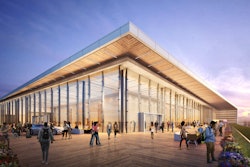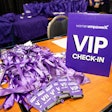
RFPs (requests for proposal) might not be the most exciting part of the job when it comes to meeting and event planning, but they're certainly an important component. And since the return of live meetings after the onset of the pandemic, the process—just like most of the industry—likely looks a bit different than it did in 2019.
That's why BizBash caught up with Sarah Buchbinder, a meeting group broker for Meetings Made Easy. She works with planners daily to help with tasks such as hotel site selection and contract negotiation—and she sees a lot of RFPs.
“It’s definitely more competitive," she says of the process today. "I’ve said that I feel like every company in the world decided at the same time to start planning meetings again. ... It's what we all asked for when we weren't planning meetings, and we couldn't wait to go back. But we're in it right now, and it's a little more stressful than I think it's ever been."
To lessen the stress—and to help planners navigate RFPs in today's climate—we asked Buchbinder for a few tips. Here's what she had to say...
1. Be prepared to make a decision quickly.
There's no doubt that RFP turnarounds are tighter today, Buchbinder says of recent changes. "There's higher compression than we've ever seen with hotels; it's more cutthroat. I don't usually use that word, but holds are not lasting long. Proposals are expiring sooner. And the turnaround time for meetings is much shorter ... I would say 12 out of the last 16 contracts I signed were for less than two months out, which is crazy." It's urgent now more than ever, she adds, to make a timely decision once you get results back from the RFP.
2. Understand that it might take hotels longer to respond.
Planners continue to deal with a staffing shortage in the industry. Respondents of MPI's Summer 2022 Meetings Outlook, released this week, cited hotels (72%), along with restaurants (73%), as segments in which they’re experiencing the most significant declines in service quality.
"We understand that hotels may have lost a lot of their sales teams, and they're handling this influx of meetings at the same time," Buchbinder says. So it's reasonable to expect that "they're taking longer to get back to us."
RFPs today are also likely posing questions to hotels that weren't normally asked pre-pandemic, she adds, including things like the number of staff on hand and if amenities like nightly turndown service are available.
3. Involve the CVB/DMO right away.
Planners know that CVBs and DMOs can be important partners for their events and meetings, and it's helpful to get them in on the ground floor of planning—especially since so much has likely changed in the destination because of the pandemic.
"I would say always copy in your convention and visitors bureau whenever you can on RFPs," Buchbinder says. "They're invaluable for local area knowledge, and sometimes they can offer financial help or site visit help."
4. If you’re casting a wide net, narrow down the list more quickly than usual.
"Previously, we would say the rates in this area at this time are X; now, it's all up in the air because everyone's working with cancelations and postponements," Buchbinder explains. "So I would say cast a wide net, but be very cognizant of the hoteliers who are spending their time filling out these RFPs, and get back to them as soon as you can. Let them know of any feedback. Narrow down the shortlist quicker than usual ... as opposed to 'a month or two later we'll make a decision,' because a month or two later, everything's different. [By that time, you'll] completely have to resource again."
5. The more flexible you can be with dates, the better—but don't announce them too soon.
Flexibility continues to be important as the industry rebounds from the pandemic, and that includes in RFPs. More wiggle room for specific dates, of course, can mean a better percentage of getting something locked in at your top venue or destination choice. Just make sure it's officially locked in before you reveal the details publicly.
"I've had clients that have done this, where they've announced the meeting before the RFP or the hotel signed," Buchbinder says. "Don't do that, because if something happens and it doesn't go through or another group swoops in and wants to sign within 24 hours, you'll lose it. And then you'll have to tell everyone it's not happening."



















